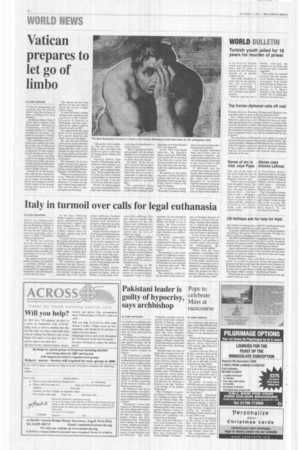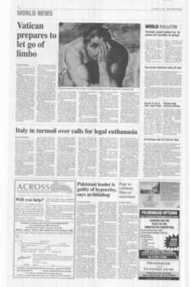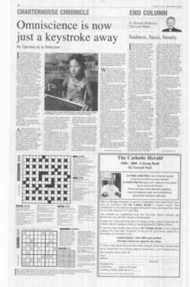Page 4, 13th October 2006
Page 4

Report an error
Noticed an error on this page?If you've noticed an error in this article please click here to report it.
Tags
Share
Related articles
Archbishop Deplores Blasphemy Decision
Protect Us From Persecution, Urges Pakistani Bishop
Italian Court
Persecution Of Christians Increases In Pakistan
Four Die In Terror Attack On Pakistani Mission Hospital
Pakistani leader is guilty of hypocrisy, says archbishop
BY STAFF REPORTER
AN AMERICAN archbishop has severely criticised the President of Pakistan for calling for toleration for Muslims while Christians are being persecuted in his country.
President Pervez Musharraf calls on others not to discriminate against Muslims, but he discriminates against nonMuslims in Pakistan, said Archbishop Charles Chaput of Denver.
The archbishop, a member of the American Commission on International Religious Freedom, co-wrote an opinion piece in The Denver Post with the commission's vice chairwoman, Elizabeth Prodromou, after Mr Musharraf delivered a speech at the United Nations calling for "enlightened moderation" to bridge a growing divide between Islamic and Western governments.
Mr Musharraf said that to build such bridges "it is itnperative to end racial and religious discrimination against Muslims and to prohibit the defamation of Islam".
"Musharraf's action plan suggests it is Western countries that must change their behaviour toward Muslims, and not the other way around," Archbishop Chaput and Miss Prodromou wrote. "Musharraf fails to address the urgent need to bring `enlightened moderation' to his own country, where intolerance and violence is aimed at both Muslims and non-Muslims," they said. "Currently, sectarian and religiously motivated violence persists in Pakistan, particularly by Sunni Muslim militants, against Shiite Muslims, Ahmadis, Hindus and Christians," they wrote. "Perpetrators of attacks on religious minorities are seldom brought to justice. Pakistan's nearly four million Ahmadis are prevented by law from fully practising their faith."
Ahmadis form two sects of Islam that emerged from the 19th-century reformist movement of an Indian Muslim, Mirza Ghulam Ahmad. The larger sect regards Ahmad as a new prophet and both are regarded as heretical by other Muslims. Since 1974 Pakistan's Constitution, which makes Islam the nation's official religion, has declared Ahmadis non-Muslim by defining a Muslim as one who "believes in the finality of the prophet Mohammed".
Miss Prodromou is associate director of Boston University's Institute on Culture, Religion and World Affairs. She and the archbishop said violations of religious freedom in Pakistan include "fatal violence against Ahmadis, torture of Christians, attacks against Shiite clerics and vandalism and destruction of churches".
They said that Pakistan's strict anti-blasphemy laws "result in extensive human rights abuses" because of the common practice of perjury. They also condemned the "honour killings" of women.
blog comments powered by Disqus

















